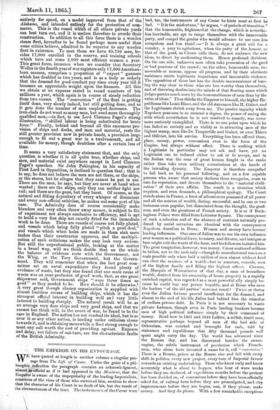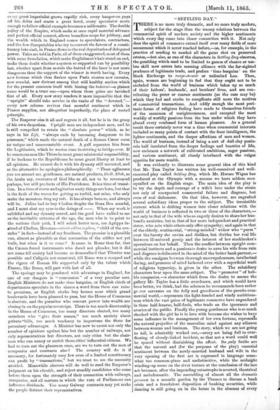THE EMPEROR ON III8 ENTOURAGE.
WE have quoted at length in another column a singular pas- sage from The Life of Caesar. Under the guise of a phi- losophic reflection the paragraph contains an acknowledgment, almost as official as if it had appeared in the Moniteur, that the Emperor is aware of the unpopularity of the leading Imperialists, conscious of the vices of those who surround him, anxious to show that the character of his Court is no fault of his, but the result of the circumstances of the time. The instruments of the Caesar were bad, too, the instruments of any Cazsar he hints must at first be bad. " It is the misfortune," he argues, " of periods of transition" that the honourable, frightened at the change, which is neverthe- less inevitable, are apt to range themselves with the immoveable party, and compel the genius who would advance to use men less scrupulous and less timid :—"It is always a great evil for a country, a prey to agitations, when the party of the honest, or that of the good, as Cicero calls them, do not embrace the new ideas, to direct by moderating them. Hence profound divisions. On the one, side, unknown men often take possession of the good or bad passions of the crowd ; on the other, honourable men, im- moveable or morose, oppose all progress, and by their obstinate resistance excite legitimate impatience and lamentable violence. The opposition of these last has the double inconvenience of leav- ing the way clear to those who are less worthy than themselves, and of throwing doubts into the minds of that floating mass which judges parties much more by the honourableness of men than by the value of ideas." Thus thinks the Emperor to himself, the higher Re- publicans like Louis Blanc, and the old statesmen like M. Guizot, and the Legitimists shrink away from me. The passive sagacity which Napoleon possesses in so unusual a degree, the power of seeing the evils which nevertheless he is not resolved to remedy, was never more curiously exemplified. There is no one point upon which he has failed so entirely and so visibly as in attracting men of the highest stamp, men like De Tocqueville and Guizot, or even Thiers and 011ivier, into his service. Everything has been offered them, place, money, power, concessions even in the form of the Empire, but always without effect. There is nothing which a Legitimist in particular may not ask and have, yet no Legitimist can be induced either to ask or to accept, and in the Italian war the sons of great houses fought in the ranks rather than take even military commissions at the hands of the intruding dynasty. The Emperor is therefore compelled to fall back on his personal following, and on a few capable persons who, aware that society declares them renegades, cease to care for reputation, and devote themselves to the " material civili- zation" of their own affairs. The result is a situation which requires, and even demands, a philosophical apology. The Court stands alone in France, a knot of adventurers possessed of all power and all the sources of wealth, daring, successful, and in one or two instances even popular, but dissociated from the thought, the good- ness, and even the greatness of French society. It is as if Buck- ingham Palace were filled from Leicester Square. The consequence of such a selection and of the absence of restraint naturally pro- duced by social ostracism are identical with the consequences Napoleon describes in Rome. Women and money have become, leading influences. One care of Julius was to use his own influence over women as a political force, to marry, and divorce, and intrigue as best might suit the wants of the hour, and his followers imitated him. The great temptation, however, was money. Caesar scattered millions in bribes, not to the mob only—though he manufactured votes on a scale possible only when half a million of men almost without food can elect the masters of a world—but to senators, consuls, men of the highest family and filling the highest offices. Crassus, the Marquis of Westminster of that day, a man of boundless wealth, derived from his ownership of house property in a rapidly enriched capital, was regarded as a most powerful ally simply be- cause he could buy any person buyable, and at Rome who save the leaders " of the old parties" were not venal? Twice or thrice even the Julian fortune proved insufficient for the demand, and almost to the end of his life Julius had behind him the stimulus of endless private debt. In Paris it is not necessary to waste private fortunes, though even in Paris leading bankers become men of high political influence simply by their command of money. Read how in 1831 and 1848 Lafitte, a selfish, timid man, representative perhaps beyond all men of the bad side of Orleanism, was courted and besought for cash, told by statesmen and republicans that fifty thousand pounds well spent might carry the day. The world has advanced since the Roman day, and has discovered besides the steam- engine, the subtle instrument of peculation which French- men, who alone have invented a name for it, call concussion." There is a Bourse, prices at the Bourse rise and fall with every shift in politics, every new project, every turn of Imperial favour towards an existing undertaking. Those who know early and know accurately what is about to happen, who hear of wars weeks before they are declared, of expeditions months before the pretext has been decided on, of concessions before they have been officially asked for, of railway laws before they are promulgated, and city improvements before they are begun, can, if they please, make money. And they do please. With a few remarkable exceptions
every great imperialist grows rapidly rich, every banger-on pays off his. debts and starts a great hotel, every speculator acute enough to follow official example becomes a millionaire. The double pulicy of the Empire, which seeks at once rapid material advance mid perfect official control, allows boundless scope for jobbery, and the wealth which in England comes to speculators, contractors, and the few disreputables who try to convert the favour of a consti- tuency into cash, in France flows to the real depositaries of delegated power. Tales are told in Paris, all of them exaggerated, most of them with some foundation, which make Englishmen's hair stand on end, make them doubt whether a system so supported can by possibility last, whether apart from morals the hatred of the loser is not more dangerous than the support of the winner is worth having. Every new fortune which thus flashes upon Paris creates new enemies, new scandal, new distrust among that still healthy section which for the present contents itself with hissing the hetairai—a plainer name would be a truer one—upon whom these gains are lavished first of all. Every new story renders it more impossible that the " upright" should take service in the ranks of the " devoted,"— every new scheme revives that scornful sentiment which in France supplies, not altogether imperfectly, the place of rooted principle.
The Emperor sees it all and regrets it all, but he is in the grasp of his own despotism. Upright men are independent men, and he is still compelled to retain the " absolute power" which, as he says in his Life, "always ends by becoming dangerous to its possessor," which made the natural death of a Roman Caesar seem an unique and unaccountable event. A gulf separates him from the Legitimists, which he wastes time in striving to bridge over. If he summons men like Thiers he must grant ministerial responsibility, if he beckons to the Republicans he must grant liberty at least to all opinions. He cannot do it with his dynasty still unrooted, and as the alternative he apologizes philosophically. "These uglinesses you see around me, gentlemen, are natural products, khelk Allah, as the Arabs say, creatures of God like us all, not to be reverenced perhaps, but still products of His Providence. It is a time of transi- tion. In a time of storm and agitation nasty things are born, but that is the fault of the waves for getting so turbid, not mine, who only make the monsters drag my raft. It has always been so, and always will be. Julius had to buy Clodius despite the Bona Dea scandal, and I must shut my eyes to the doings of —. When my work is solidified and my dynasty seated, and the good have rallied to me as the inevitable outcome of the age, the man who is to point to the nations their path, I will select better men, use Agrippa in- .stead of Clodius, Mecenas—atavis editus regibus, " child of the cru- sades" in fact—instead of my freedmen. The promise is a plausible one, almost as plausible as that coronation of the edifice not yet built, but when is it to come ? It came in Rome thus tar, that the Caesars found instruments who dared not plunder, but it did not come till society had become so demoralized that Tiberius was possible and Caligula not unnatural, till Rome was a cesspool and the vigour of Roman life supported only by the valour which France, like Rome, will part with last of all.
The apology may be pondered with advantage in England, for one of our dangers is " concussion " of a very peculiar sort. English Ministers do not make time bargains, or English chiefs of departments speculate in the shares a word from them can raise to premium, or English clerks buy houses near which grand boulevards have been planned to pass, but the House of Commons is absolute, and the parasites who convert power into wealth are closing in on the popular sovereign. There is too much directorship in the House of Commons, too many directors elected, too many members who " give their names," too much anxiety about private °bills, too much tendency to importune the State for pecuniary advantages. A Minister has now to count not only the number of opinions against him but the number of railways, not only representatives but directors, not only cities but the chair- men who can annoy or enrich those cities' influential citizens. We had to turn out the placemen once, are we to turn out the men of companies and contracts also ? The country will do it if necessary, for fortunately very few even of a limited constituency can profit by "transactions," but we trust to see the necessity avoided. Meanwhile electors will do well to read the Emperor's judgment on his clientele, and reject steadily candidates who come before them upon the strength of their connection with railways, companies, and all matters in which the vote of Parliament can influence dividends. Too many Galway contracts may yet make the people distrust their representatives.































 Previous page
Previous page